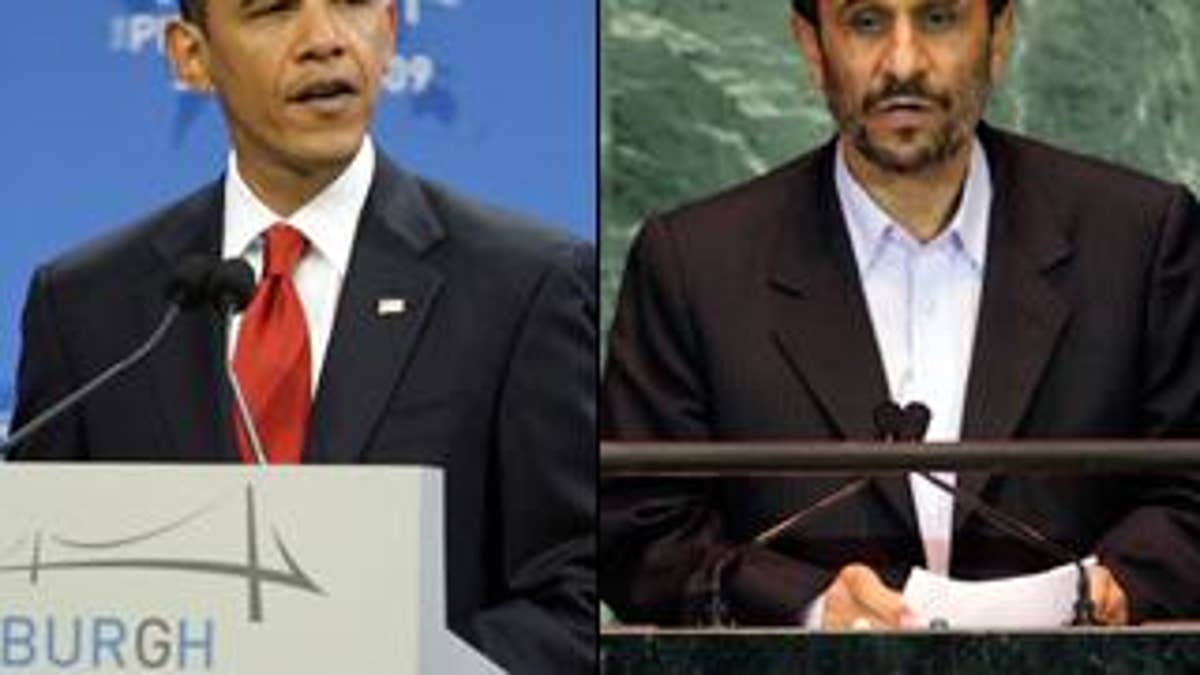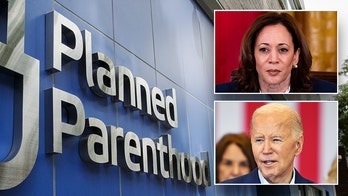
As renewed verbal hostilities between the U.S. and Iran threaten to derail the prospect of diplomatic talks, President Obama may find there are few diplomatic options left to stop the Islamic regime from pursuing nuclear technology.
After nearly 30 years of no diplomatic relations, Iran and the United States are meeting Oct. 1, along with five other nations. A week of meetings at the U.N. in New York aimed at thwarting Iranian nuclear ambitions appeared to offer hopeful signs, even ones of openness from Iran.
But a grand bargain may be out of the question after the latest developments.
Obama revealed Friday that Iran has been building a second nuclear facility, and he, along with British Prime Minister Gordon Brown and French President Nicolas Sarkozy, accused Tehran of hiding the site and demanded that Iran allow nuclear weapons monitors inspect it.
Iranian President Mahmoud Ahmadinejad fired back, saying those leaders would "regret" their charges and that Tehran never hid the facility. On Friday evening, the Islamic leader told CNN's Larry King that Obama's accusations that its nuclear program broke international agreements are "baseless."
"This is an extremely serious matter," John Bolton, a U.N. ambassador in the Bush administration, told FOX News. "I think it demonstrates the continuing deceit and deception that Iran has been practicing on its nuclear weapons program and why any real prospect of negotiations with them is now once again revealed to be frivolous."
Bolton said the Oct. 1 meeting now becomes "the moment of truth."
"And if Iran continues to insist that all of its facilities are for peaceful purposes, then I think we will really find out whether new sanctions are in order and whether any new sanctions actually deter Iran from continuing to pursue nuclear weapons," he said.
If the talks in Geneva lead to a dead end, Obama will look to impose tougher sanctions on Iran. But for any sanction to be effective, Russia and China would have to be on board because of their large and growing trade and investment interests in the Gulf region.
Russian President Dmitry Medvedev has suggested his government might look favorably at stiffening sanctions if Iran proves unreceptive. But China remains publicly opposed to threatening penalties and threw cold water on that option toward Iran.
"China always believes that sanction and pressure should not be an option and will not be conducive to the current diplomatic efforts over the Iran nuclear issue," said Chinese Foreign Ministry spokeswoman Jiang Yu.
Robert Tappan, a former State Department official in the Bush administration, said Russia and China offer the U.S. the most leverage because the United Nations cannot be relied upon.
"The U.N. is as strong as its weakest link," he said. "Whether they're going to have enough teeth to get Tehran to sit up and take notice and react accordingly remains to be seen. So then the next set of options is quieter diplomacy done by allies."
David Aaron, the director of a Center for Middle East Public Policy at the Rand Corporation, said it's not unusual to wish the U.N. had more power in these situations. "But if we had a UN that had that kind of power, our Congress would go crazy," he said, adding that most members are pleased with the limited capacity of the U.N.
Robert Schadler, a senior fellow in public diplomacy at the American Foreign Policy Council and a State Department official in the Reagan administration, is skeptical that the U.S. can find any solution.
"I guess diplomacy is, I would think, a very unlikely route but certainly should be tried," he said. "I am pessimistic about all the options, including a military strike. They're all very bad, including letting Iran have nuclear weapons."
But Schadler noted that there are sanctions that could hurt Iran, such as targeting their oil imports, and moves that could lead to marginal success.
"I do think it might be interesting to in some way show some daylight between Ahmadinejad, who is the looniest of the group, but recognizing he's not the ultimate power," he said, suggesting that the U.S. could offer additional talks, but only with other top Iranian leaders.
If those moves didn't work, Schadler said, the only option left might be to allow Iran to pursue nuclear capabilities -- a prospect that doesn't alarm him as much as others. But diplomacy, he said, is "the least worst option in the next six months."
To some observers, the situation Obama finds himself ultimately has roots in the administration of President Jimmy Carter, who suffered irreparable political damage after a failed attempt to rescues hostages taken from the U.S. embassy by Iranians in 1979.
Aaron, a deputy national security advisor in the Carter administration, said the two situations are different but there are similarities.
"It's the same story every president has faced, which is some repellent thing that the Iranians have up their sleeves and executed against us," he told FOXNews.com.




